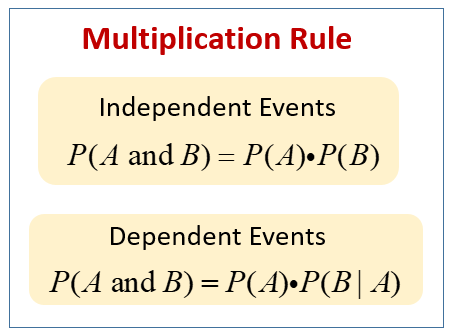

Multiplication Rule for Probability
Related Topics:
Common Core (Statistics & Probability)
Common Core for Mathematics
In this video, an example is shown using the multiplication rule of probability with cards. Independent events and dependent events are discussed.
Conditional Probability and the Multiplication Rule.
Multiplication Rule for Conditional Probability.
Conditional probability and the general multiplication rule
Two examples using playing cards of the general multiplication rule for conditional probabilities. Conditional Probability and Multiplication Law of Probability



Common Core (Statistics & Probability)
Common Core for Mathematics
Common Core: HSS-CP.B.8
Examples, solutions, videos, and lessons to help High School students learn how to apply the general Multiplication Rule in a uniform probability model, P(A and B) = P(A)P(B|A) = P(B)P(A|B), and interpret the answer in terms of the model.- Define the probability of event (A and B) as the probability of the intersection of events A and B.
- Understand P(B|A) to mean the probability of event B occurring when A has already occurred.
- Use the multiplication rule, P(A and B) = P(A)P(B|A) = P(B)P(A|B), to determine P(A and B).
- Determine the probability of dependent and independent events in real contexts

In this video, an example is shown using the multiplication rule of probability with cards. Independent events and dependent events are discussed.
Two examples using playing cards of the general multiplication rule for conditional probabilities. Conditional Probability and Multiplication Law of Probability
Try out our new and fun Fraction Concoction Game.
Add and subtract fractions to make exciting fraction concoctions following a recipe. There are four levels of difficulty: Easy, medium, hard and insane. Practice the basics of fraction addition and subtraction or challenge yourself with the insane level.



We welcome your feedback, comments and questions about this site or page. Please submit your feedback or enquiries via our Feedback page.